The Vaudois (Waldenses) are in fact descended from those refugees from Italy, who, after St. Paul had there preached the gospel, abandoned their beautiful country and fled like the woman mentioned in the Apocalypse, to these wild mountains, where they have to this day handed down the gospel from father to son in the same purity and simplicity as it was preached by St. Paul.
See footnote 1
THE preceding chapter brought the story of the Waldenses up to the
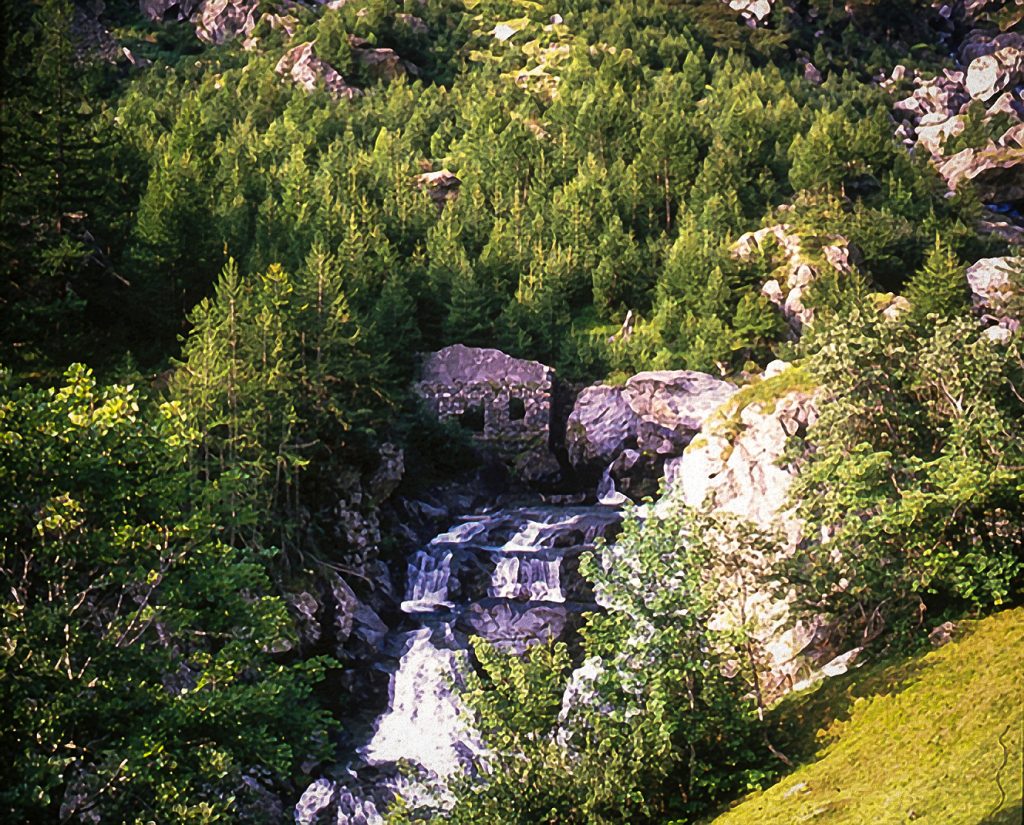
Peter Waldo. He gave a new impetus to this
THEIR RECORDS DESTROYED
Persecution was not the only way of waging war against the evangelicals. Their records were systematically destroyed. In the empires of
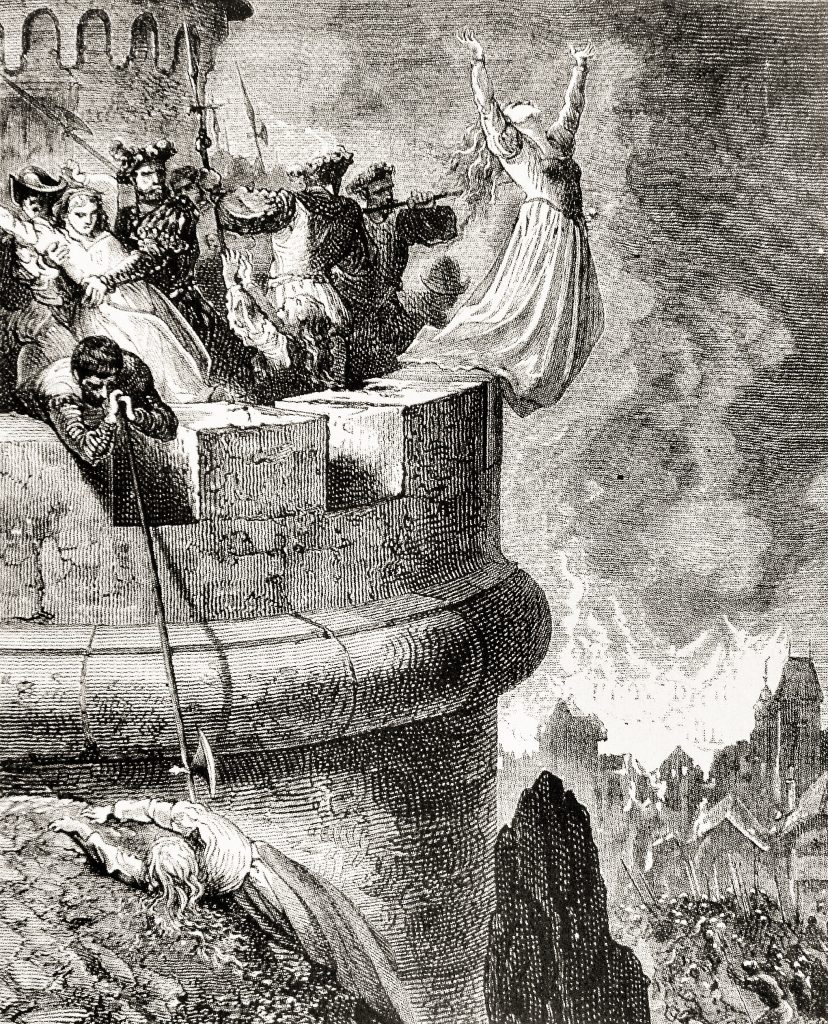
antiquity anew conqueror often followed up his purging of the preceding dynasty by the destruction of all writings telling of its past, even to the extent of chiseling annals from stone monuments. In like
LEARNING OF THE WALDENSES
The Waldensian pastors and teachers were well trained. To refute the
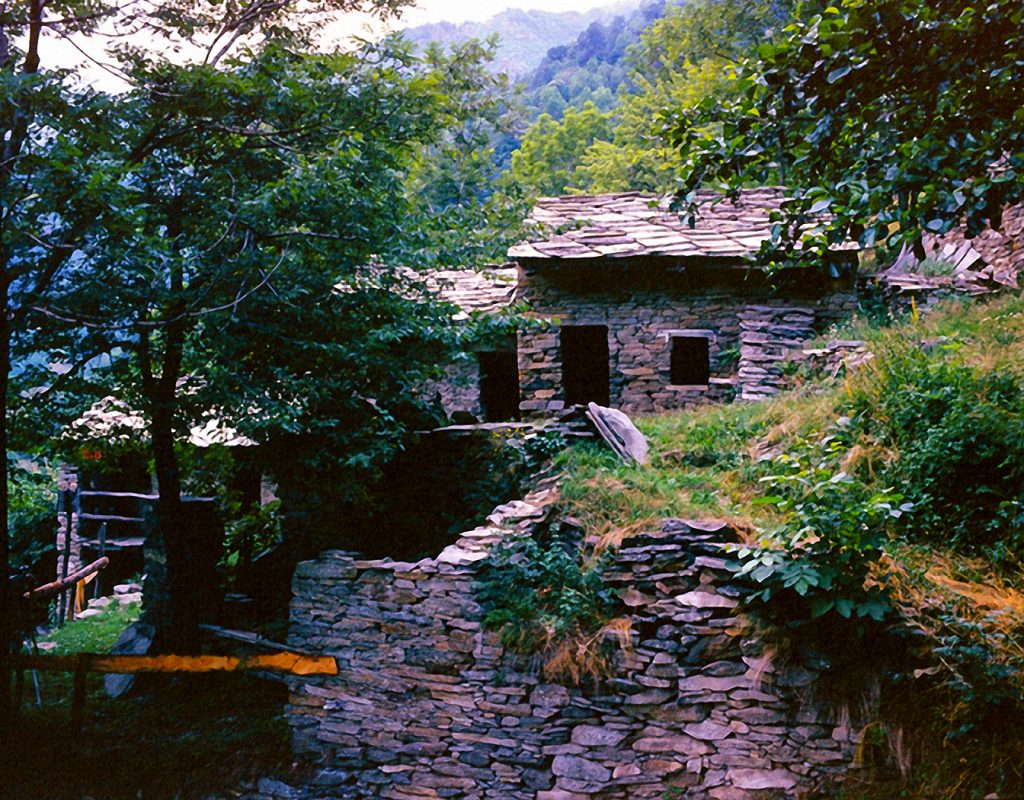
reproach sometimes cast on them, the following quotations are given. Alexis Muston writes: Gilles says, ‘This Vaudois people have had pastors of great learning…versed in the languages of the Holy Scriptures…and very laborious…especially in transcribing to the utmost of their ability, the books of Holy Scripture, for the use of their disciples.”(4) S. V. Bompiani states:
See footnote 5
Unfortunately many of these books were lost during the persecutions of the seventeenth century, and only those books and ancient documents sent to the libraries of Cambridge and Geneva by Pastor Leger were preserved. The papists took care after every persecution to destroy as much of the Waldensian literature as possible. Many of thebarbes were learned men and well versed in the languages and science of the Scriptures.A knowledge of the Bible was the distinctive feature of theancient, and is now of the modem Vaudois… . Deprived for centuries of a visible church, and forced to worship in caves and dens, this intimate knowledge of God’s word was their only light. Their school was in the almost inaccessible solitude of a deep mountain gorge called Pra del Tor, and their studies were severe and long-continued, embracing the Latin, Romaunt, and Italian languages.
Alexis Muston also writes:
Superstition, obscuring the moral and religious perceptions,
See footnote 6cast sits shadows equally over all the regions of human intelligence; as, on the other hand, also, the light of the gospel…elevates, augments, and purifies all the powers of the mind. Of this, the Vaudois themselves are a proof, for they had taken their place,…at the head of modern literature, having been the first to write in the vulgar tongue. That which they then used was the Romance language, for all the early remains of which we are indebted to the Vaudois. It was from this language that the French and Italian were formed.
The religious poems of the Vaudois still continue to be the most perfect compositions belonging to that period; and they are also those in which the rays of the gospel shine with the greatest brightness.
The idea engendered and fostered by Rome that the Waldenses were few in number, without much organization or learning, and dependent upon Rome for their Bible and culture is dispelled by abundant trustworthy and scholarly testimony.
Seemingly they took no share in the great struggle which was going on around them in all parts of Europe, but, in
See footnote 7reality they were exercising a powerful influence upon the world. Their missionaries were everywhere, proclaiming the simple truths of Christianity, and stirring the hearts of men to their very depths. In Hungary, inBohemia, in France, in England, in Scotland, as well as in Italy, they were working with tremendous, though silent power. Lollard, who paved the way for Wycliffe in England, was a missionary from these Valleys…. In Germany and Bohemia the Vaudoisteachings heralded, if they did not hasten, the Reformation, andHuss and Jerome, Luther and Calvin did little more than carry on the work begun by the Vaudois missionaries.
The extent to which the doctrines of the Waldenses or Albigenses had been accepted by the nobility may be seen by the following quotation from Philip Mornay:
Many great and noble men joined unto them as namely, RaymundEarle of Toulouse and of S. Giles, the king’s cousin, Raymund Roger Vicount of
See footnote 8 & 9Besiers and ofCarcasonne , Peter Roger Lord ofCabaret, Raymund, Earl of Foix, near kinsman to the king of Arragon,Gasto Prince of Beam, the Earle of Bigorre, the Lady of the Vaur, the Earl of Carman, Raymund de Termes, Americ de Montreuil, William de Menerbe, and infinite others, both Lords and Gentlemen, men truly of that rank that no man of sound judgment will think, they would have exposed to manifest danger their life fortunes and honor for the defense of vices and errors so execrable as they were charged with all. (8) After earlyschooling it was not uncommon for the Waldensian youth to proceed to the seminaries in the great cities of Lombardy or to theUniversity of Paris.(9)
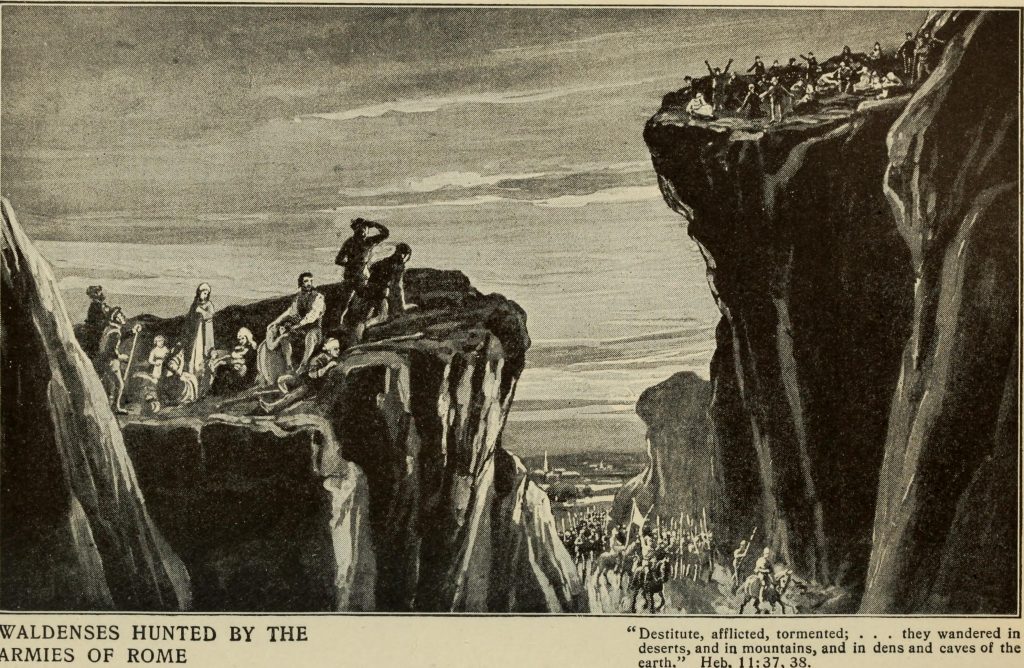
A PEOPLE OF THE BIBLE
It is indeed gratifying that this branch of the Church in the Wilderness was a Bible people. No subsequent Protestant church reverenced the HolyScriptures more than did they. Their obedience to the book of God was at once the cause of their incomparable success, as it was also the offense which they gave to their enemies. Through the long night of the Dark
“The version current among the Western heretics can be shown to be based upon the Greek and not upon the Vulgate.”
See footnote 12
When the fall of the Roman Empire came because of the inrush of the Teutonic peoples, the Romaunt, that beautiful speech which for centuries bridged the transition from Latin to modem Italian, had become the mother tongue of the Waldenses. They multiplied copies of the Holy Scriptures in that language for the people.13 In those days the Bible was, of course, copied by hand. (14)
The Bible formed the basis of the congregational worship, and the children were taught to commit large portions of it to memory
PERSECUTIONS OF THE WALDENSES
There were persecutions before the thirteenth century against those considered as Waldenses, who perhaps went under other names. For hundreds of years, wars of extermination were waged in order to destroy every vestige of the writings of these different bodies. No artifice,
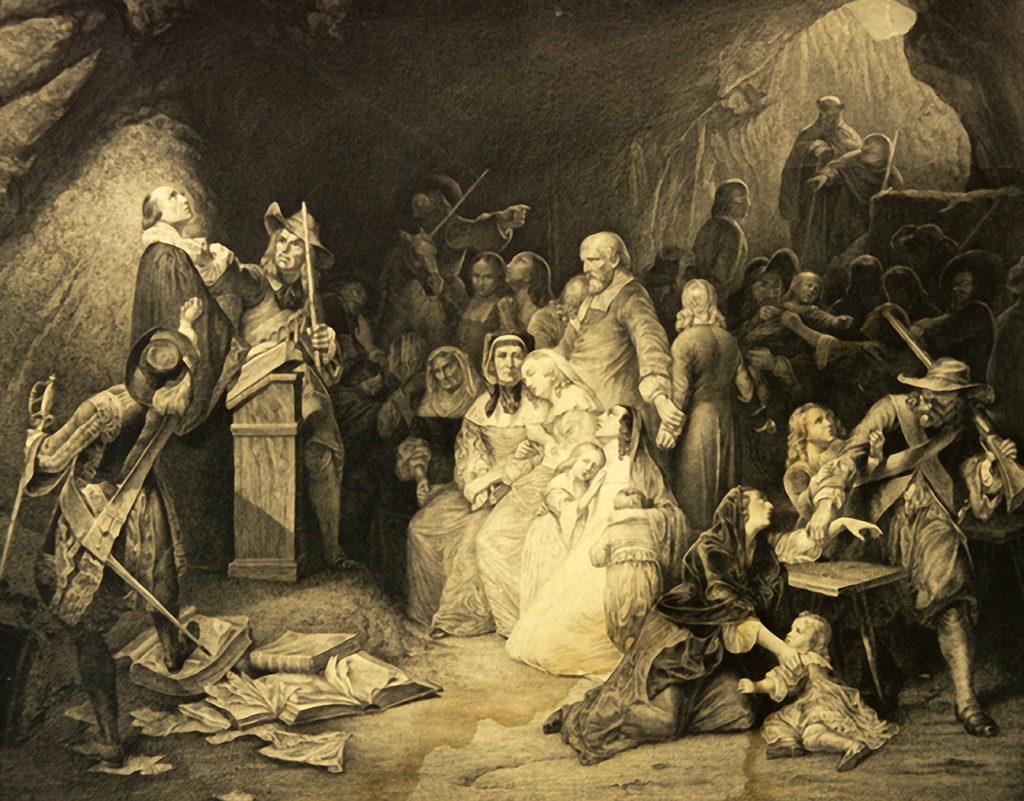
no exertion, no expense, was spared by their enemies to efface all the records of the ancient Waldenses from the face of the earth. There was no village of the Vaudois valleys but had its martyrs. The Waldenses were burned; they were cast into damp and horrid dungeons; they were smothered in crowds in mountain caverns, mothers and babes and old men and women together; they were sent out into exile in a winter night, unclothed and unfed, to climb the snowy mountains; they were hurled over the rocks; their houses and lands were taken from them; their children were stolen to be indoctrinated with the religion that they abhorred. Rapacious individuals were sent among them to strip them of their property, to persecute, and to exterminate them.
“Thousands of heretics, old men, women, and children, were hung, quartered, broken upon the wheel, or burned alive, and their property confiscated for the benefit of the king and Holy See.”
See footnote 18
So many books have been written relating these circumstances and picturing these heart-rending scenes that further enumeration is unnecessary. It is sufficient to say that the Waldenses remained true to the truth. When the Reformation dawned, under Luther,
TRUTH PLANTED IN MANY LANDS
Urged on by the power of truth triumphant, the Waldenses went forth to Europe. How widespread was the work of
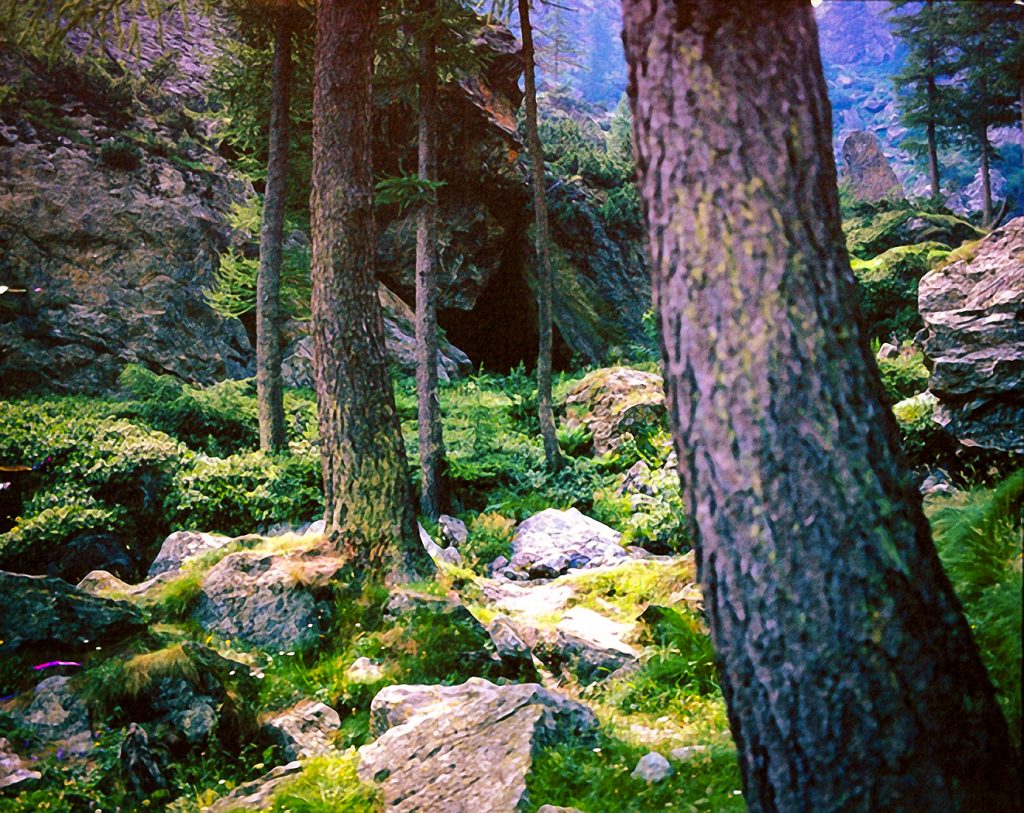
the European coasts, and appear in Gaul, Spain, England, Scotland
Some have claimed that the Albigenses were different from the Waldenses. However, the truth is that they did not differ in belief. They are called Albigenses only because of Albi, the French city which was their headquarters. But the decrees of the popes have condemned them as Waldenses; papal
“legates made war against them as professing the beliefs of the Waldenses; the
See footnote 21monks Inquisitors, have formed their Proces and Indictments as against the Waldenses: the people have persecuted them as being such…. Many historiographers call them Waldenses.”
How the Waldenses or Albigenses made converts among Bulgarians the following quotation from Philip Mornay will show: Matthew Paris saith further, That they spread themselves so far as into Bulgaria, Croatia, and Dalmatia, and there took such root, that they drew unto them many bishops: and thither came one Bartholomew from Carcassone in the country of Narbon in France, unto whom they all flocked…and he created bishops, and ordained churches. (22)
PROTESTANTISM A GLORIOUS FRUIT OF WALDENSIANISM
In 1517, the dawn of the Protestant Reformation came to Europe. Protestantism was not so much
Thus the time passed on until the Reformation dawned upon the world. The Vaudois were well pleased
See footnote 23at this general awakening of the human mind. They entered into correspondence with the Reformers in various parts ofEurope, and sent several of their Barbas to them to instruct them. The Reformers on theirpart, admitted the antiquity of the Vaudois rites and the purity of theirfaith, and treated the mountain church with the greatest respect. On the twelfth of September, 1532, a Synodal Assembly was held at Angrogna. It was attended by a number of deputies from the Reformed Churches in France and Switzerland. Among them was William Farel of France…. He manifested the greatest interest in the manuscript copies of the Bible which the Vaudois had preserved from the earliest times, and at his instance, the entire Bible was translated intoFrench, and sent as a free gift from the Vaudois to the French Church.
The simplicity and purity of their lives was the result of the simplicity and purity of their doctrines. They followed the command of the apostle John that no man should add to, nor take from, the word of God. This attitude was a great defense against
The ancient Vaudois constantly rejected doctrines that were based on authority and human tradition; they repelled, with holy indignation and horror, images, crosses, and relics, as objects of veneration or worship; the adoration and intercession of the
See footnote 24Virgin Mary and the saints; they consequently rejected the feasts consecrated to these same saints, the prayers addressed to them, the incense and tapers that were burned in their honor; they likewise rejected the mass, auricular confession, purgatory, extreme unction, and prayers for the dead, holy water, Lent, abstinence from meat at certain times and on certain days, imposed fasts and penances, processions, pilgrimages, the celibacy of the clergy, blessed monkery , etc., etc. Their declaration on these points is as explicit as it is strong.
Reinerius Saccho, their enemy, was obliged to admit that they were a commandment-keeping people:
Concerning their manners, he [Reinerius] writes, they were modest, simple, meddling little with bargains or contracts
See footnote 25…. That the first rules and instructions which for rudiments they gave unto their childrenwas the Decalogue of the law, the Ten Commandments.( 25)
It was to be expected that persecutions, isolation, and desperate circumstances would tear away many of the people from some of their beliefs; and that at times there would be a certain amount of conformity to papal practices. Furthermore, when the Reformation, manifesting extreme liberalism in many things, swept over Europe, it had a great influence upon the ancient churches which had long suffered for many of the doctrines to which the Reformers turned. These ancient churches possessed in many points identical beliefs with those announced by the Reformation. Unfortunately, in their joy over the
DID THE EARLY WALDENSES KEEP THE SABBATH?
Before taking up the specific cases of the observance of the Sabbath by the ancient Waldenses, it would be profitable to glance at the status of Sunday observance at the end of what is usually reckoned to be the first period of church history, terminating in the Council of Nicaea (A.D. 325). Constantine, who was the first Christian ruler of the Roman Empire at the time when the church and the state were coming together in perfect union, issued his now-famous Sunday law (A.D. 321).
The emperor Constantine after his conversion to
See footnote 27Christianity, made the observance of Sunday acivil duty, and the law which commanded it is found in the Roman code. ‘Let all judges and people of the town rest, and the trades of various kinds be suspended on the venerable day of the sun. Those who live in the country may, however, freely and without fault apply to agriculture, because it often happens that this day is the most favorable for sowing wheat and planting the vine, lest an opportunity offered by divine liberality be lost with the favorable moment.’ Now we can scarcely conceive that Constantine would have excepted agriculturallabor, if the church had from time immemorial strictly forbidden among Christians that kind of work whichit prohibited at a later period…. Hence it has been the unanimous doctrine of divines, from time immemorial, that cessation from servile work is not only a point of discipline liable to change but it can be dispensed with by ecclesiastical authority whenever a reasonable cause presents itself.
There is ample evidence to show that the above quotation does not reveal any incidental condition or anything unusual in the observance of Sunday in the fourth century. This was not only the custom of the state church in general, but it can be proved that the same church claimed that she had power enough to institute Sunday in the beginning, and also to say how much work should or should not be done on that day. As evidence, another quotation from the same journal is given
To place the subject in a clearer light, we may state that, according to many learned writers it was not strictly commanded to abstain from work on Sunday during the first ages of the church. This day was undoubtedly viewed by Christians as a day of joy, of triumph, and of gratitude to God; and they convened in the church to offer their homage to the Almighty; but there is no evidence to show that cessation from work was considered obligatory; probably because there might have been some danger of Judaism in this cessation from work, and perhaps also because practice, in the time of persecution, would have greatly exposed the professors of Christianity. It was deemed sufficient to substitute public prayer for the Jewish Sabbath, particularly as the latter was observed by many of the faithful.
See footnote 28
Thus it can be seen that Sunday in the early Christian centuries was not a holy day of divine appointment, but was, rather, appointed by man, and physical labor was carried on. From the quotations of church historians which follow, it will be seen that in the churches of the East as well as in all the churches of the West, except Rome, the Sabbath was publicly observed by those who were courageous enough to withstand the rising tide of those endeavoring to appease a sun-worshiping heathen world which gave special prominence to Sunday.
In contrast to the questionable beginnings of Sunday, consider the seventh-day Sabbath at the same time. The following two quotations have been given before, but are worthy of repetition. Socrates, a church historian of the fourth century, wrote thus:
“For although almost all the churches throughout the world celebrate the sacred mysteries on the Sabbath of every week, yet the Christians of Alexandria and at Rome, on account of some ancient tradition, have ceased to do this.”
See footnote 29
Another quotation from the church historian, Sozomen, who was a contemporary of Socrates, declares:
“The people of Constantinople, and almost everywhere, assemble together on the Sabbath, as well as on the first day of the week, which custom is never observed at Rome or at Alexandria.”
See footnote 30
The substance of these two quotations reveals that the Christianity of the Greek Church was a Sabbath keeping Christianity; and that the Christianity of the West, with the exception of the city of Rome and possibly Alexandria, was also a Sabbath keeping Christianity. However, there is more specific information regarding the observance of the Sabbath before 325 when one considers the history of Spain. Spain had the good fortune to escape for centuries any marked influence of the church
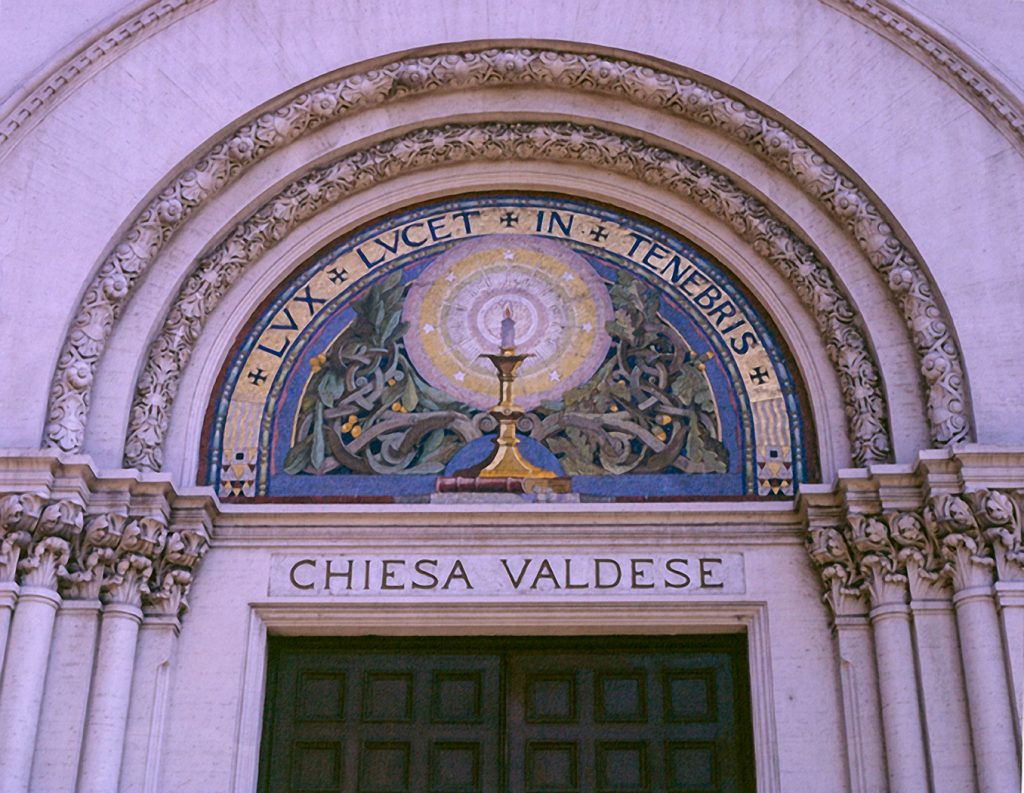
creed later adopted at Nicaea;31 secondly, punishment of
Saturday, the seventh day.
“As to fasting every Sabbath: Resolved, that the error
See footnote 32be corrected of fasting every Sabbath.”
This resolution of the council is in direct opposition to the policy the church at Rome had inaugurated, that of commanding Sabbath as a fast day in order to humiliate it and make it repugnant to the people.33 What connection is there between these facts and the early Waldensians? It is this: that while for centuries Christianity in Spain was one, yet when the encroachments by Rome on these primitive Christians in Spain began, the people of the Pyrenees separated themselves from the errors that crept in upon them. Robert Robinson writes that the people living in the valleys indifferent countries became known as the “valley dwellers,” or Vallenses. Infact, this author states his belief that the inhabitants of the Pyrenees werethe true original Waldenses
THE WALDENSES, A BIBLE PEOPLE
The stronger the church at Rome grew, the greater was the emphasis placed upon Sunday. On the other hand, the churches which continued in
apostolic Christianity clung as long as possible to the day which JesusChrist and the apostles sanctified. The Waldenses were so thoroughly a Bible people that they kept the seventh-day Sabbath as the sacred rest day for centuries. Two centuries after Pope Gregory I (A.D. 602) had issued the bull against the community of
“He lays it down also as one of their opinions; that the Law of Moses is to be kept according to the letter, and that the keeping of the Sabbath, circumcision, and other legal observances, ought to take place.”
See footnote 41
However, the accusation that they practiced circumcision has been repeatedly proved to be false. Writing of the Passagians, who are taken to be a branch of the Waldenses, David Benedict says:
The account of their practicing circumcision is undoubtedly a slanderous story forged by their enemies, and probably arose in this way. Because they observed the seventh day, they were called, by way of derision, Jews, as the Sabbatarians are frequently at this day; and if they were Jews, it followed of course, that they either did or ought to circumcise their followers. This was probably the reasoning of their enemies; but that they actually practiced the bloody rite, is altogether improbable.
See footnote 42
Adam Blair says:
Among the
See footnote 43we have by the same peoples, an explanation of the Ten Commandments, dated by Boyer 1120. It contains a compend of Christian morality. Supreme love to God is enforced, and recourse to the influence of the planets and to documents is condemned. The evil of worshiping God by image sand idols is pointed out. A solemn oath to confirm anything doubtful is admitted, but profane swearing is forbidden. Observation of the Sabbath, by ceasing from worldly labors and from sin, by good works, and by promoting the edification of the soul through prayer and hearing the word, is enjoined. sorcerers,
In spite of the fury of the oppressors, the protecting hand of Christ was on His commandment-keeping people. They grew in numbers. But it was not until the twelfth century that the bishop of Rome became terrified over the growth of the Waldenses. The so-called heretics in southern France were
“It has been affirmed that the orders of the Franciscans and Dominicans
See footnote 46were instituted to silence the Waldenses.”
As to the persecutions suffered by the Waldenses for Sabbath keeping, the following is found in the decree of Alphonso, published about 1194:
Alphonse, king of Aragon
See footnote 47etc. , to all archbishops, bishops, and to all others:… We command you in imitation of our ancestors and in obedience to the ordinances of the church, that heretics, to wit, Waldenses, Insabbathi and those who call themselves the poor of Lyons and all other heretics should be expelled away from the face of God and from all Catholics and ordered to depart from our kingdom.
The use of the term “Insabbathi” in the previous quotation, designating those who should be expelled from Spain, leads to a consideration of Spanish Sabbathkeepers in medieval times. That the Insabbatati wereWaldenses is proved by the statement of Bernard Gui, famous program builder of the Inquisition, that “
“It was a maxim with the
See footnote 53catholics to avoid the mention of heresy in their synods, lest it should create a desire in any to know what it was. They forbad preachers to quote even their good arguments lest the people should entertain a favorable opinion of the authors.”
These terms Sabbati, Sabbata, Insabbatati refer to keeping the seventh day as the Sabbath. The historian
“They were called Insabbatti, not because they were circumcised, but because they kept the Sabbath according to Jewish law.”
See footnote 54
Shortly after the decree of King Alphonso against the Insabbatati there flourished a fervent papal writer in Spain who has subsequently obtained considerable notoriety. This was Lucas of the city of Tuy, generally known as Lucas Tudensis. His writings make it clear how strong and how numerous were the Insabbatati in Spain about 1260. Lucas died about seventy-five years before the appearance of Wycliffe, “Morning Star of the Reformation.” A splendid summary of his writings is given as follows:
Those, who will take the trouble to read this work, and observe how fondly Lucas dwells upon the presumed opinions of Isidore, the Spanish saint, how he laments that Spanish enthusiasm should be cooled, and should not burst out in arms against the enemies of the Catholic faith — how he declaims against heretical conventicles— the public disputations of heretics — their profanation of the parish churches — the arrival of
See footnote 55Arnald in Spain and the transactions at Leon, — will perceive that the mind of Lucas was occupied by the consideration of Spanish and not of Albigensian,or foreign nonconformity.
The following testimony concerning the Sabbath was given by a Waldensian prisoner before the Inquisition (probably in
Mary, on that she has nothing to answer. Concerning Sunday and feast days she says:
‘The Lord God commanded us to rest on the seventh day and with that I let it be; with God’s help and His grace, we all would stand by and die in the faith, for it is the right faith and the right way in Christ.”
See footnote 56
The blessing of Christ upon these, His persecuted children, was so great that they entered into many lands. Mosheim declares that, prior to the age of Luther, there lay concealed in almost every country of Europe-especially in Bohemia, Moravia, Switzerland, and Germany — many persons in whose minds
following quotation of Lamy:
All the counselors and great lords of the court, who were already fallen in with the doctrines of Wittenburg, of Augsburg, Geneva,and Zurich, as Petrowitz, Jasper
Cornis , Christopher Famigall, JohnGerendi , head of the Sabbatarians, a people who did not keep Sunday, but Saturday, and whose disciples took the names ofGenoldists . All these, andothers, declared for the opinions ofBlandrat.(58)
There is an abundance of testimony to show the harmonious chain of
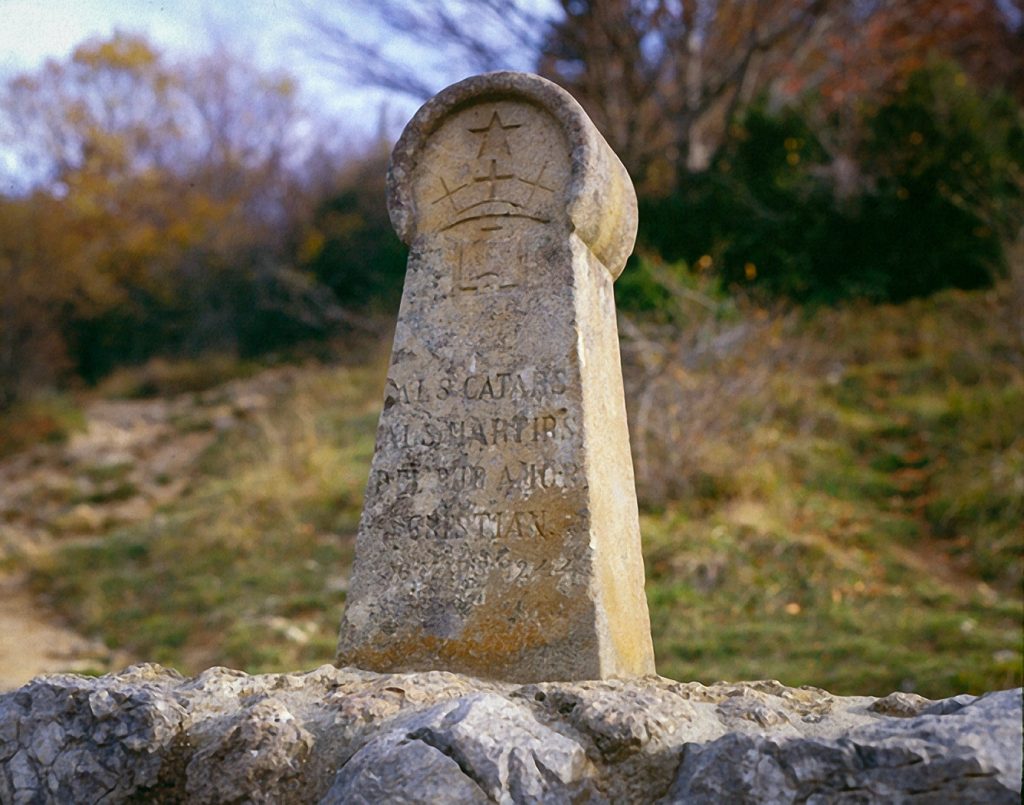
doctrine extending from the days of the apostles down to the Reformation and later, including the beliefs held by the believers of northern Italy, the Albigenses, the Wycliffites, and the Hussites. Andre Favyn, a well-known Roman Catholic historian, who wrote in French, traces the teachings of Luther back through Vigilantius to Jovinianus, claiming that Vigilantius gave his doctrines to “the Albigenses, who otherwise were called theWaldenses,” and that they
“Passagii and Passagini, or the inhabitants of the passes,from the Latin word passagium, is one of the names given by ancientauthors to the Waldenses.”
A large proportion of the Waldenses, whether called by that name or by other names, believed the observance of the fourth commandment to be obligatory upon the human race. Because of
“No evidence has been adduced, that before the enactment of this law there was Sabbatical observance of the Lord’s Day in any part of Christendom.”
See footnote 60
That the Waldenses would be committed to Saturday as the Sabbath can be seen in these words:
“They hold that none of the ordinances of the church that have been introduced since Christ’s ascension ought to be observed, being of no worth; the feasts, fasts, orders, blessings, offices of the church and the like, they utterly reject.”
See footnote 61
This is said of them in Bohemia. Erasmus testifies that even as late as about 1500 these Bohemians not only kept the seventh day
THE WALDENSES AND THE REFORMATION
Although the reformed churches transformed the face of Europe, they failed to reject certain Latin practices which arose later to plague them. Pastor Robinson, in his farewell address to the Pilgrims departing from the shores of Holland to seek a new world, said that it was impossible for churches (referring to the Reformers) which had lately come out of such thick anti-Christian darkness to have received all the light.
Perhaps, if the churches of
The descendants of the Waldenses who lived shut up in the valleys of
See footnote 63Piedmont, were led by their proximity to the French and Genevans to embrace their doctrines and worship. Yet they retained not a few of their ancient rules of discipline, so late as the year 1630. But in this year the greatest part of the Waldenses were swept off by pestilence; and their new teachers, whom they obtained from France, regulated all their affairs according to the pattern of the French Reformed Church.
Although the Waldenses were one in essential doctrines with the churches of the Reformation, they did not lose their separate organization. There formed churches grew in power to such an extent that in countries like Germany and England, they were free from Rome’s persecutions. This, however, was not the case of the Waldenses, still under the rule of Italy. After a synod when a delegation of Reformers met with them, they vowed to witness publicly more boldly than ever before. January 21, 1561, the day after delegates from their churches had sworn eternal friendship upon the snowy summits of the Alps, a decree from their enemies was published ordering all Waldenses to attend mass. After warlike attempts to drag them to the galleys, the stake, the prison, and the gallows, they developed such resistance and endurance that the
“In 1655 the persecution raged again, and if all the Protestant powers of Europe had not interposed a complete annihilation of the Waldenses would have been the result.”
See footnote 64
In 1689, their pastor and hero, Henri Arnaud, led nine hundred of their warriors from Switzerland to the border town of Balsille. All winter they resisted an army of ten thousand. When all seemed lost the
Avenge, O Lord,
Lie scattered on the Alpine mountains cold,
Ev’n them who kept
When all our fathers worshiped stocks and stones.
Forget not: in
Who were Thy sheep and in their ancient fold
Slain by the bloody Piedmontese that rolled
Mother with infant down the rocks. Their moans
The vales redoubled to the hills, and they
To heaven. Their martyred blood and ashes sow
O’er all the Italian fields where still doth sway
The triple tyrant: that from these may grow
A hundredfold, who having learned Thy way
A WORLD-WIDE AWAKENING TO BIBLE PROPHECIES
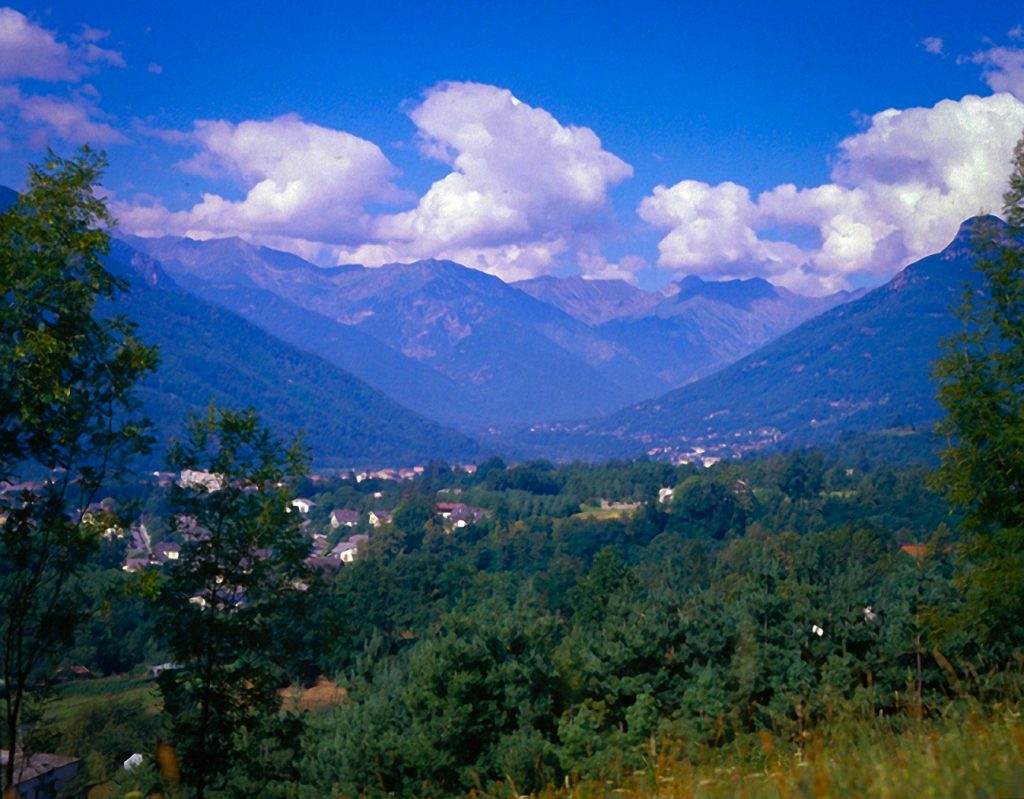
Protestantism was largely
Protestantism grew mightily, and as it went on in expanding Bible study, its churches awoke in the eighteenth century to the urgent necessity of heeding the warnings wrapped up in Bible prophecies.
“He has not yet come, though he cannot be far off; for he is to appear at the end of the forty-two months of the first beast.”
See footnote 66
The 1260-year period of prophecy had become the concern of all. This led to a closer study of the seventy weeks of Daniel 9 in which the date of Christ’s crucifixion was a determining factor. The time was near for the church to come up out of the wilderness. This led to prayerful and learned consideration of the longer 2300-day period of Daniel 8. Bible societies sprang into existence; missionary associations were formed. Missionariesdeparted into all lands to announce that “the time of the end” had come. The centuries of faithfulness seen in the history of the Church in the Wilderness were succeeded by the period of the Remnant Church who would “keep the commandments of
FOOTNOTES/ SOURCES:
1.Arnaud, The Glorious Recovery by the Vaudois, Preface by the author, p.xiv.
2 Benedict, A General History of the Baptist Denomination, vol. 1, p. 112.
3. Gilly, Waldensian Researches, p. 39; Jones, The History of the Christian Church, vol. 2, p. 6; Robinson, Ecclesiastical Researches, p. 178.
4. Muston, The Israel of the Alps, vol. 2, p. 448.
5. Bompiani, A Short History of the Italian Waldenses, pp. 56, 57.
6. Muston, The Israel of the Alps, vol. 1, p. 36.
7. McCabe, Cross
8. Mornay, The
9. Wylie, The History of Protestantism, vol. 1, pp. 29, 30.
10. Nolan, The Integrity of the Greek Vulgate, pp. 88, 89.
11. Allix, The Ancient Churches of Piedmont, p. 37.
12. Warner, The Albigensian Heresy, vol. 1, p. 12.
13. Henderson, The Vaudois, pp. 248,249.
14. In a famous library in Dublin, Ireland, the writer saw one of the four extant copies of this Waldensian Bible.
15. Bompiani, A Short History of the Italian Waldenses, pp. 2, 3.
16. Muston, The Israel of the Alps, vol. 1, p. 52.
17. Ibid., vol. 2, p. 448.
18. Thompson, The Papacy
19. Gilly, Waldensian Researches, p. 76.
20. Edgar, The Variations of Popery, pp. 51, 52.
21. Perrin, Luther’s Forerunners, pt. 2, pp. 1, 2.
22. Mornay, The
23. McCabe, Cross and Crown, p. 37.
24. Monastier, A History of the Vaudois Church, pp. 83, 84.
25. Mornay, The every persecution of Iniquitie, p. 449.
26. Muir, The Arrested Reformation, p. 3.
27. The United States Catholic Magazine, Index to vol. 4, 1845, pp. 233,234.
28. The United States Catholic Magazine, Index to vol. 4, 1845, p. 233
29. Socrates, Ecclesiastical History, b. 5, ch. 22, found in Nicene and Post-Nicene Fathers, 2d Series, vol. 2.
30. Sozomen, Ecclesiastical History, b. 7, ch. 19, found in Nicene and Post-Nicene Fathers, 2d Series, vol. 2.
31. Robinson, Ecclesiastical Researches, p. 180. It should be noted that some church historians place the date of the Council of Elvira at A.D.324; among these is Michael Geddes, an eminent authority on Spanish church history.
32. “Errorum
33. See the author’s discussion in Chapter 20, entitled, “The Great Struggle in India,” pp. 311-314.
34. Robinson, Ecclesiastical Researches, p. 299.
35. Ibid., p. 302.
36 Ibid., p. 310.
37. The writer had the privilege of visiting Sabadell many years ago and assisting in the baptism of Christian converts.
38. Robinson, Ecclesiastical Researches, pp. 319-321.
39. Mansi, Sacrorum Conciliorum Nova et Amplissima Collectio, vol. 13, p.852.
40. Responsa Nicolai Papae I ad Consulta Bulgarorum, Responsum 10, found in Mansi, Sacrorum Conciliorum Nova et Amplissima Collectio
41. Allix, The Ancient Churches of Piedmont, p 154.
42. Benedict, A General History of the Baptist Denomination, vol. 2, p. 414.
43. Blair, History of the Waldenses, vol. 1, p. 220.
44. Warner, The Albigensian Heresy, vol. 1, p. 15.
45. Adeney, The Greek and Eastern Churches, p. 218.
46. Gilly, Waldensian Researches, p 98, note 2.
47.
48. Gui, Manuel d’ Inquisiteur, vol. 2, p. 158.
49. Du Cange, Glossarium Mediae et Enfimae Latinitatis, art. “
50. Geddes, Miscellaneous Tracts, vol. 2, p. 26.
51. Whishaw, Arabic Spain, pp. 19, 20; also Mosheim, Institutes of Ecclesiastical History, b. 3, cent. 11, pt. 2, ch. 4, par. 1.
52. Geddes, Miscellaneous Tracts, vol. 2, p. 71.
53. Robinson, Ecclesiastical Researches, pp. 271,272.
54. Quoted by Dr. Jacob Gretzer, Opera Omnia, vol. 12, pt. 2, p. 11. 55.
55. Gilly, Waldensian Researches, pp. 102, 103.
56. Der Blutige Schau-Platz, Oder Martyrer Spiegel der Taufs Gesinnten, b.2, pp. 30,31.
57. Mosheim, Institutes of Ecclesiastical History, b. 4, cent. 16, sec. 3, pt. 2
58. Lamy, The History of
59. Favyn, Histoire de Navarre, pp. 713-715.
60. Cox, The Literature of the Sabbath Question, vol. 1, p. 257.
61. See Lewis, A Critical History of Sabbath and Sunday, pp. 211,212.
62. Cox, The Literature of the Sabbath Question, vol. 2, pp. 201,202.
63. Mosheim, Institutes of Ecclesiastical History, b. 4, cent. 16, sec. 3, pt. 2, ch. 2, par. 25.
64. M’Clintock and Strong, Cyclopedia, art. “Waldenses.”
65. Gibbons, The Faith of Our Fathers, p. 111, 63d ed.; p. 86, 76th ed.
66. Notes on Revelation 14.


